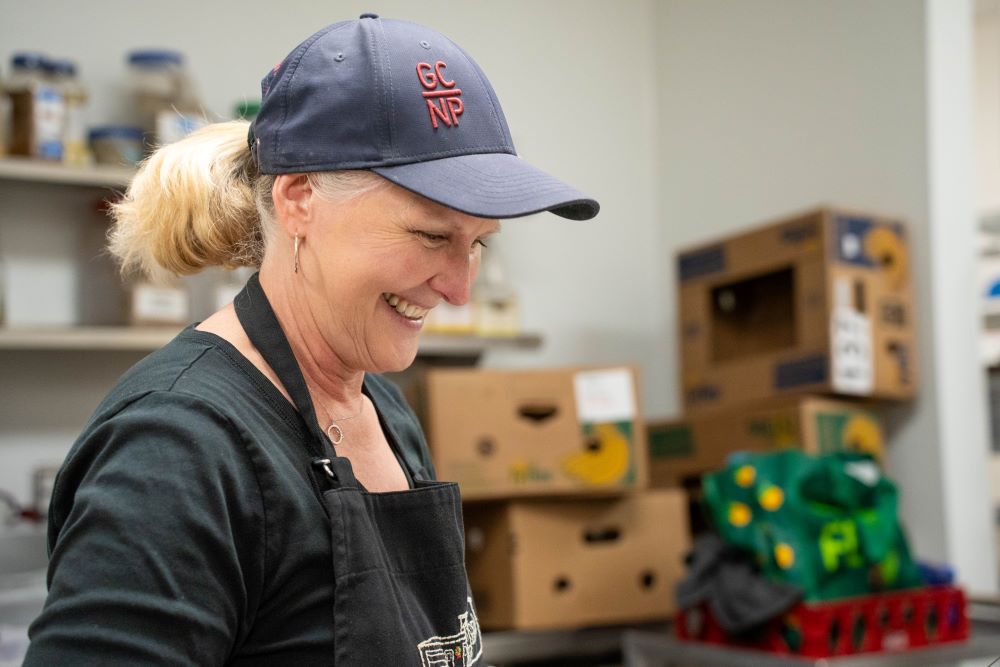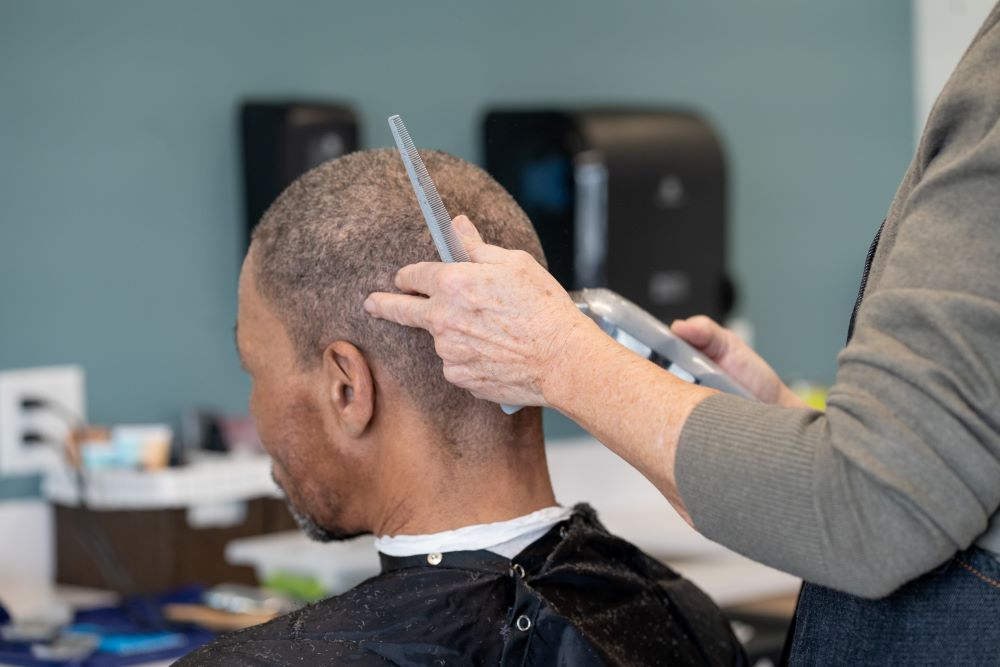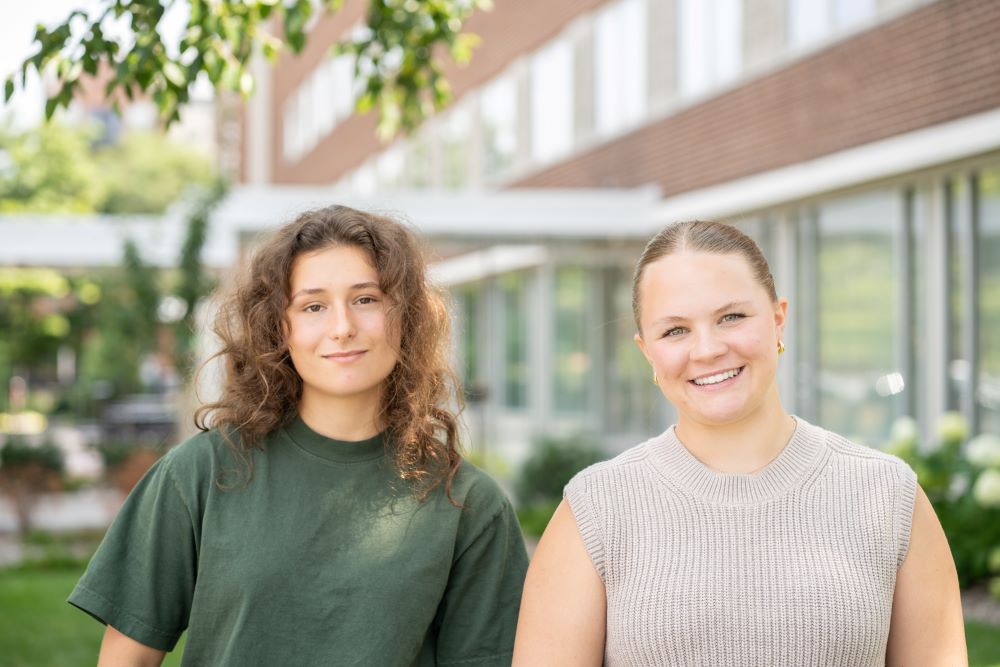Baking for Families in Shelter
A Meaningful Way to Volunteer
During the pandemic, Betty Swords was searching for a meaningful way to help. With more free time for baking, she quickly realized that the cookies and cakes were piling up at home. Wanting to put her skills to good use, she reached out to Catholic Charities to see if there was a way she could volunteer. The team helped set up an opportunity for Betty to bake for guests at Catholic Charities’ Family Service Center (FSC) in Maplewood.
Since then, Betty has volunteered more than 250 times, creating desserts for families experiencing homelessness in Ramsey County. Betty meticulously plans her recipes, adapting to available ingredients, food allergies, and preferences of shelter guests.
Her desserts are a small but meaningful source of joy for the families in shelter.
Supporting Families Experiencing Homelessness
The Family Service Center provides shelter, meals, and supports to families in crisis, helping them regain stability and find permanent housing. Volunteers play an essential role at FSC. For Betty, volunteering is a natural extension of a lifelong commitment to service. She encourages others to do the same: “Find your niche, something you enjoy. It makes it easy to keep going back.” Her desserts do more than satisfy a sweet tooth — they remind families that someone cares.
Catholic Charities relies on the generosity and dedication of volunteers, offering not just food and shelter but also dignity and community.
“Find your niche, something you enjoy. It makes it easy to keep going back.”
Volunteers Needed
Volunteering with Catholic Charities Twin Cities can take many forms, and our teams can accommodate anyone who wants to put their talents to use!
Getting started as a volunteer is easy, with daily shifts available at various program sites across the Twin Cities. We also offer opportunities for groups, families, youth, and student internships. To learn more, visit: cctwincities.org/volunteer
The Importance of a Haircut
Catholic Charities Twin Cities is currently seeking licensed volunteer hairstylists and barbers—especially those with experience with curly & coily hair. Scheduling is flexible with daytime shifts available Monday through Friday.
Are you a hairstylist or barber interested in making a difference? Email us at volunteer@cctwincities.org to get started!
Providing a Haircut to Someone in Need
Catholic Charities Twin Cities volunteers do a wide range of things to help the agency serve people in need every day. And of the long list of daily services offered at the St. Paul and Minneapolis Opportunity Centers, haircuts are in high demand. For many people, a haircut can help you feel like yourself—and can make a difference in how the world treats you.
Meeting a Community Need
Alice Shea, a Roseville resident and former salon owner, brings over four decades of experience to her Monday morning volunteer shifts. While clipping hair in the Opportunity Center’s sun-filled personal care room, Alice shared her story, why she chooses to volunteer regularly, and emphasized the importance of a haircut.
“I retired from salon ownership and working a little over three years ago,” said Alice. Shortly after retiring, Alice heard about the St. Paul Opportunity Center’s new salon space through a friend. “She told me that this was just opening and that they needed volunteers” Alice explained.
Since then, Alice has been a regular volunteer. During the pandemic, when services like hair care weren’t available, Alice picked up volunteer shifts at the Catholic Charities Distribution Center.
Originally from Minnesota, Alice remarked, “I went to Barber School right here on Seven Corners! The Cossetta’s building used to house the Barber School that I went to.” Cutting hair in the same neighborhood fifty years later, Alice said, “I feel like I’m making a full circle here.”
Almost before she had finished speaking, Erik, a guest at the St. Paul Opportunity Center, showed up for his appointment with Alice and asked, “Hey, are you cutting hair? It’s been two years since I’ve had my hair cut.” Erik told us he had “been kind of going in with scissors” himself since his last haircut and described his hair as “a real mess”.
Unfortunately, not everybody in need of hair care can receive service each week. According to Alice, “there’s always people who come up and stop by to see if they can get a haircut”, who weren’t able to make an appointment.
“It feels good to provide this service for people that might not otherwise be able to access it. To have your head washed and be given a haircut and some personal attention makes a big difference.” – Alice
Help Wanted!
Catholic Charities Twin Cities is currently seeking licensed volunteer hairstylists and barbers—especially those with experience with curly & coily hair. Scheduling is flexible with daytime shifts available Monday through Friday.
Are you a hairstylist or barber interested in making a difference? Email us at volunteer@cctwincities.org to get started!
Support for Homeless Elders
An Unexpected Experience with Homelessness
Bill has been a member of the St. Paul community for a long time and worked for years to support people experiencing homelessness in different ways. He served on the Board of Directors for Westside Community Health (now known as Minnesota Community Care), volunteered regularly, and became familiar with services available to people facing homelessness.
In the Spring of 2019, Bill’s apartment flooded after heavy rains and snowmelt, and homelessness was something he began to experience himself. Bill and other residents of his building were forced to evacuate, and he had nowhere to go and couldn’t afford a new apartment. Fortunately, Bill knew where to turn for resources. Even with that knowledge, he was unprepared for the challenges he now faced. “I didn’t think it would happen to me,” Bill admitted, “but I knew what to do.”
Bill turned to Catholic Charities for help. At Dorothy Day Place in St. Paul, Bill found shelter, dignity, and hope. The facility provided meals, laundry services, and compassionate care. Bill had the support needed to rebuild his life.
Catholic Charities Homeless Elders Program
After staying at the overnight shelter at Dorothy Day Place for several months, Bill found the Homeless Elders Program. The Homeless Elders team provides case management to people over the age of 60 who are experiencing homelessness. The program helps elders get connected to resources, housing, and other supportive services to assist with successful independent living.
Through the Homeless Elders program, Bill met with Dani, his case manager. Her empathy and guidance helped him regain stability and plan for the future. “She comes to you and gets to be your friend,” Bill said. “Dani saw me.”
“Transition is difficult the older you get – change is not easy,” Bill said. “but Dorothy Day Place is fantastic for any individual . . . tell them what you need, and they’ll help you.”
Personalized Support for Vulnerable Neighbors
Bill’s path to stability was not without further obstacles. As he began to find his footing, the COVID-19 pandemic upended his plans. Catholic Charities relocated vulnerable neighbors, including Bill, from shelters to hotels for safety.
Dani’s personalized approach made Bill feel valued and supported as he worked toward rebuilding his life. With her help, he transitioned into permanent housing, a milestone that surprised Bill with its efficiency. “Transition is difficult the older you get – change is not easy,” Bill said. “But Dorothy Day Place is fantastic for any individual . . . tell them what you need, and they’ll help you.”
Catholic Charities’ Homeless Elders program is a lifeline for individuals like Bill. This program addresses the unique challenges faced by older adults experiencing homelessness, who often struggle with physical health issues, limited financial resources, and the emotional toll of displacement.
Extending Services During Cold Weather
Bridging Gaps in Service During Winter Storms
When winter storms bring frigid weather, these dangerous conditions pose a serious threat to people experiencing homelessness in the Twin Cities. This month, temperatures remained well below freezing – with subzero windchills – for days on end. In response to this cold snap, Catholic Charities Twin Cities took measures to ensure that people had access to shelter from the elements. For Catholic Charities, this meant extending service hours across the agency to host warm spaces for those in need, making sure that cold weather essentials were readily available to shelter guests, and collaborating with other service providers, and both Hennepin and Ramsey Counties.
This is extremely important because many daytime shelters close their doors hours before evening shelters open. This leaves people with nowhere warm to go in conditions that can be life-threatening.
Collaboration with Ramsey County’s Warming Spaces
Each year, Ramsey County operates Winter Warming Spaces for people experiencing homelessness during cold weather months. People experiencing homelessness in St. Paul can stay warm overnight at a handful of designated sites.
Ramsey County announced that three Winter Warming Spaces will be open from 9 p.m. to 7 a.m. every night. The Warming Spaces will continue to operate through the end of March.
There will be a free shuttle service from 9 p.m. to 7 a.m. each day, ensuring transportation to and from Winter Warming Space locations. On days with extreme winter weather, Catholic Charities Twin Cities will extend daytime shelter hours until 9 p.m. so that guests have a warm place to stay until Ramsey County shuttles begin to run. “We see this gap every winter and we do our best to meet needs until nighttime services become available,” said Jen Kissling, program manager at the St. Paul Opportunity Center, “our staff do everything possible to make sure people get to warm spaces safely.”
Homelessness in Minnesota
There are not enough overnight shelter beds in the Twin Cities to serve every person experiencing homelessness. This year’s Minnesota Homeless Study conducted by Wilder Research showed that, “in 2023, nearly one-quarter (23%) of the homeless population spent at least half of the previous month outside, compared to 13% in 2012.”
Catholic Charities Twin Cities has seen a comparable uptick in its emergency services division this year, the branch of the agency responsible for serving people at its daytime and overnight shelters, medical respite, and targeted mental health care programs. Working with community partners to bridge gaps in service this winter will ensure that more people have access to warm spaces on frigid days and nights.
New Beginnings at the Family Service Center
Tom’s Family Seeks Support
Tom is a hardworking man who built a good life in Florida. There, he was close to his parents and was able to establish himself as a tradesman. His success as an HVAC contractor allowed him to live comfortably, be there for his parents, and support his daughter while she lived with her mother in Minnesota. But in just over a year, Tom suffered a series of devastating losses. The mother of Tom’s daughter passed away unexpectedly, and in the following year, Tom lost both of his parents.
Suddenly Tom was navigating the experience of being a single father without the support of family. He picked up extra jobs and worked overtime to make sure his daughter had everything she needed. But living without the support of family wasn’t sustainable for Tom. They started struggling to get by and he knew their situation needed to change. So, Tom and his daughter packed everything they had and drove to Minnesota, where Tom grew up. They planned to stay with a relative in the Twin Cities, but a house fire destroyed the home before they arrived. Tom was devastated when he heard the news. “It’s hard to take so many hits and keep getting up,” he explained, “but I didn’t have a choice.”
With nowhere else to go, Tom and his daughter turned to Catholic Charities for help – they moved into shelter at Catholic Charities Family Service Center in February of 2024.
Catholic Charities Family Service Center
Catholic Charities Family Service Center shelter provides critical support for families experiencing homelessness. They offer a safe place to stay, and the resources needed to get families back on their feet. With a focus on creating stability, the center offers services like emergency shelter, meals, childcare, case management, and employment assistance. The goal is to help families like Tom’s regain independence and find a permanent place to call home.
At the Family Service Center, Tom and his daughter found not only a roof over their heads, but a community dedicated to helping him rebuild. The staff helped set up routines for Tom and his daughter, provided access to childcare, and connected Tom to job opportunities.
“The people here helped me out . . . they showed up for me, and did everything they could to help us find a place of our own.”
A New Home in St. Paul
With the guidance and resources from the Family Service Center, Tom was finally able to begin properly grieving the losses he had experienced while being there for his daughter. Within two months, he and his daughter moved into their own apartment in St. Paul. “I’m so grateful that this program exists,” said Tom. “The people here helped me out . . . they showed up for me, and did everything they could to help us find a place of our own.”
Now, Tom and his daughter have begun a new chapter, rebuilding their life together in their new home.
Celebrating Thanksgiving at Catholic Charities Programs
Providing Thanksgiving Meals to People Experiencing Homelessness
Each Thanksgiving, many people have food on their minds — but what does this holiday look like for people who don’t have reliable access to food or housing? We spoke with Ms. Bev, chef at the Minneapolis Opportunity Center, to hear about how she serves people experiencing homelessness each Thanksgiving. After nearly twenty years with Catholic Charities, Ms. Bev has a reputation for her custom menus and her holiday meals are always a hit.
Over a week in advance, guests “started asking what I was going to cook for the holiday,” shared Ms. Bev. And after years of preparing Thanksgiving meals for hundreds of hungry Opportunity Center guests, it was no surprise that Ms. Bev already had a plan. “The menu this year is turkey and dressing, green bean casserole, fruit salad, mashed potatoes, cranberry sauce, assorted pies, punch, and coffee,” she explained.
One longtime volunteer, Anne Gallick, comes to the Minneapolis Opportunity Center each year the week of Thanksgiving with one goal: to peel all the potatoes. She helped peel potatoes by chance her first year and decided that it would be her specialty. She attends each year with her own peeler in hand — typically preparing more than 50 pounds of potatoes. Similarly, the Deeg family has a tradition of volunteering to come in each year and carve turkeys. Ms. Bev will start her morning at the Opportunity Center at 4:30 a.m. on Thanksgiving, where she will finish preparing 50 pounds of green beans, 50 pounds of stuffing, and guide her volunteers as they carve into 16 turkeys.
Collaborating to Feed the Community
The Mary F. Frey Minneapolis Opportunity Center is a pillar of our community’s emergency services infrastructure. The Opportunity Center is a day shelter that offers hot meals, showers, mail service, employment counseling, and more — including on Thanksgiving Day.
On Thanksgiving, Ms. Bev and her team will be able to set tables and serve all the guests that come in for the holiday. “I fancy the dining room up using a red tablecloth on each table with a small bowl of candy for each guest,” explained Ms. Bev. “We have everybody leave the space before the meal until we get every table set, and then invite them back in and serve them individually.”
After the Thanksgiving meal is served at the Opportunity Center, Ms. Bev usually starts her second shift cooking for 15 family members at her house. Ms. Bev says, “it’s a lot of work, but I like it.”
Thanks to staff like Ms. Bev and partners like Second Harvest Heartland, Catholic Charities provides Thanksgiving meals at all ten of the agency’s meal programs and seven residential buildings where residents typically cook for themselves.
Feeding Neighbors in St. Paul
For the past 20 years, Ron has volunteered at Catholic Charities Dorothy Day Place campus in St. Paul. He started volunteering in the kitchen at the recommendation of a friend, and is also part of a special group of season volunteers there.
For the past 15+ years, a group of five retired men has gathered at Catholic Charites Dorothy Day Place on the day before Thanksgiving to carve turkeys in preparation for the annual Thanksgiving Dinner. The Wednesday morning turkey-carving festivities are filled with a spirit of camaraderie, laughter, and loyalty. This group of dedicated men typically carve about 37 turkeys — just enough to feed the 700+ people that rely on the daytime shelter at Dorothy Day Place on an average day.
Deb’s Journey at Dorothy Day Place
Deb’s Story: Building a Home at Dorothy Day Place
Deb is an independent single mother, veteran, and Twin Cities native. Deb and her dog Minnie live together in an apartment at Dorothy Day Residence, a Catholic Charities Twin Cities supportive housing program in St. Paul. The two of them have lived at Dorothy Day since 2019 when the building was renovated.
Deb’s journey has been marked by incredible strength in the face of overwhelming adversity. Her life turned upside down about 10 years ago when the person she was living with withheld rent payments leading to an eviction and homelessness. Deb has kept her struggles hidden, working seasonal jobs and moving around between shelters.
“I didn’t know about the resources that were available for the five years that I was homeless,” Deb explained. By 2019, she had reached a breaking point and decided to leave the unhealthy relationship with her partner at the time and move away from him. This ultimately left her with nowhere to go. So, Deb found her way to Catholic Charities Higher Ground Shelter in St. Paul.
Catholic Charities Dorothy Day Place
Higher Ground had opened the year prior as part of Catholic Charities Dorothy Day Place – an integrated two-building campus designed to prevent and end homelessness by focusing on dignified shelter, permanent homes, and dedicated services. Deb was placed in an apartment across the street in Dorothy Day Residence, one of two housing programs on campus.
At Dorothy Day Place, Deb found not only shelter and housing, but a community and resources. She felt hesitant when she first arrived at the overnight shelter in December 2019, but the warmth of those around her changed her perspective. “Everybody just sort of started coming out of their shells,” Deb recalls. “There are people that I’ve met that I never would have otherwise . . . and I wouldn’t change that ever.” The relationships Deb formed, and the support she received, empowered her to imagine new possibilities.
“There are people that I’ve met that I never would have otherwise . . . and I wouldn’t change that ever.”
Pursuing New Goals
Resources at Dorothy Day have made a difference for Deb while living there. The Opportunity Center below her apartment offers everything from meals to employment resources. Community partnerships with organizations including the Animal Humane Society and Second Harvest Heartland have helped Deb and other residents with things like pet care and groceries – free of charge.
Today, Deb is pursuing new goals. She is back in school, working toward a degree in data analytics with a goal of becoming a data scientist. But one dream is on Deb’s mind: moving to California with Minnie to be with close friends. But for now, her community at Dorothy Day provides her with a sense of purpose and belonging.
Sandra’s Story: Older Adult Homelessness
Sandra Johnson’s Experience with Homelessness as an Older Adult
Sandra Johnson’s motto is, “I shall pass this way but once; any kindness I can do, let me do it now, for I shall not pass this way again.” And once you get to know her, you realize that she truly lives her life by those words.
More than anything else, Sandra cares deeply for other people. Family comes first for her, but that kindness also shines in her lifelong volunteerism and career in customer service.
Yet, Sandra’s life has also been full of battles. She lost her husband to a tragic accident at a young age, raised her four young children on her own, and fought cancer and chronic illnesses more than once. When her former employer outsourced most of their customer service work, she lost her job and began battling with something new: homelessness as an older adult.
How Homelessness Can Happen to Older Adults
“I lost my home in 2006,” Sandra explained. “It was a drawn-out process, and all I could do was watch as my retirement and other savings slowly disappeared.” Sandra’s mother also passed away during this time. Between funeral expenses, medical debt, and a mortgage, there was nothing Sandra could do to save her home.
“So, I went from staying with my church family, to staying with my actual family, to staying in my car – until it was towed one day,” Sandra said.
For the next six years, Sandra experienced homelessness, albeit not in the way most people envision it. During those years, Sandra found work whenever possible, cared for family members who had fallen ill, and even managed to continue volunteering at the Sabathani Community Center to help seniors with computer literacy. In fact, many people who knew Sandra at that time had no idea she was experiencing homelessness.
The Importance of Deeply Affordable Housing
But in April of 2012, one of Sandra’s friends learned about her housing situation and recommended a deeply affordable place to live. That’s how Sandra discovered Catholic Charities Evergreen Residence, an 88-unit permanent housing program near Target Field in Minneapolis.
Sandra has lived at Evergreen since then, and has said that, “it has been like a safe haven for me; it provided stability in the midst of my instability.” Now, Sandra can engage even more deeply in her community. She enjoys cooking meals to share with her neighbors every Tuesday, continues to volunteer, and advocates for her community at the Minnesota Capitol.
“When I moved in here, I realized that my journey is not over,” Sandra said. “I know what it’s like to be homeless, and I know what it’s like to eat ramen 365 days a year. But now I never have to worry.”
“When I moved in here, I realized that my journey is not over,” Sandra said. “I know what it’s like to be homeless, and I know what it’s like to eat ramen 365 days a year. But now I never have to worry.”
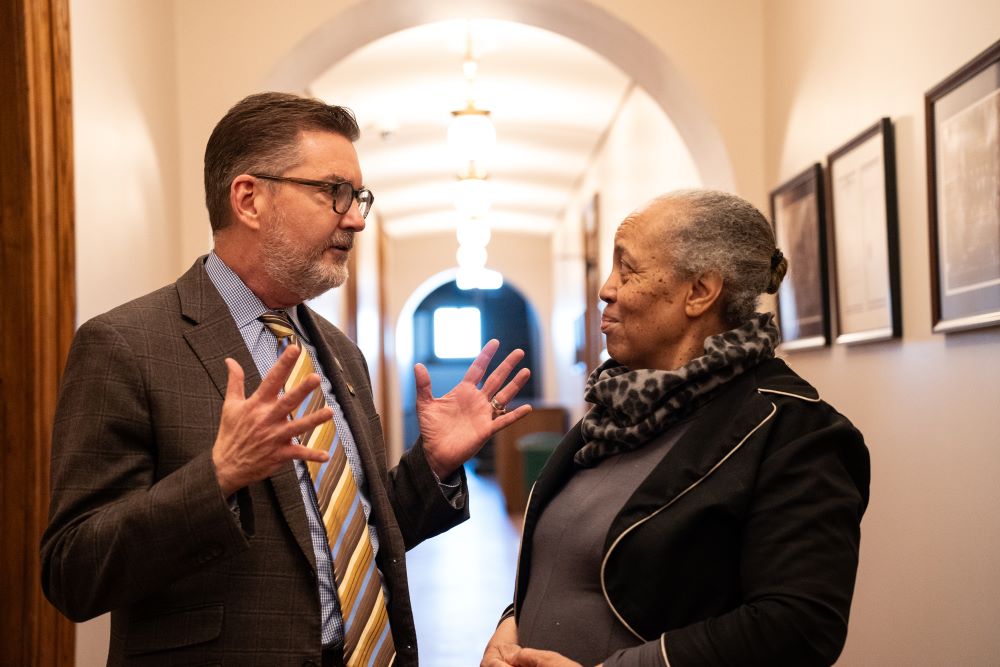
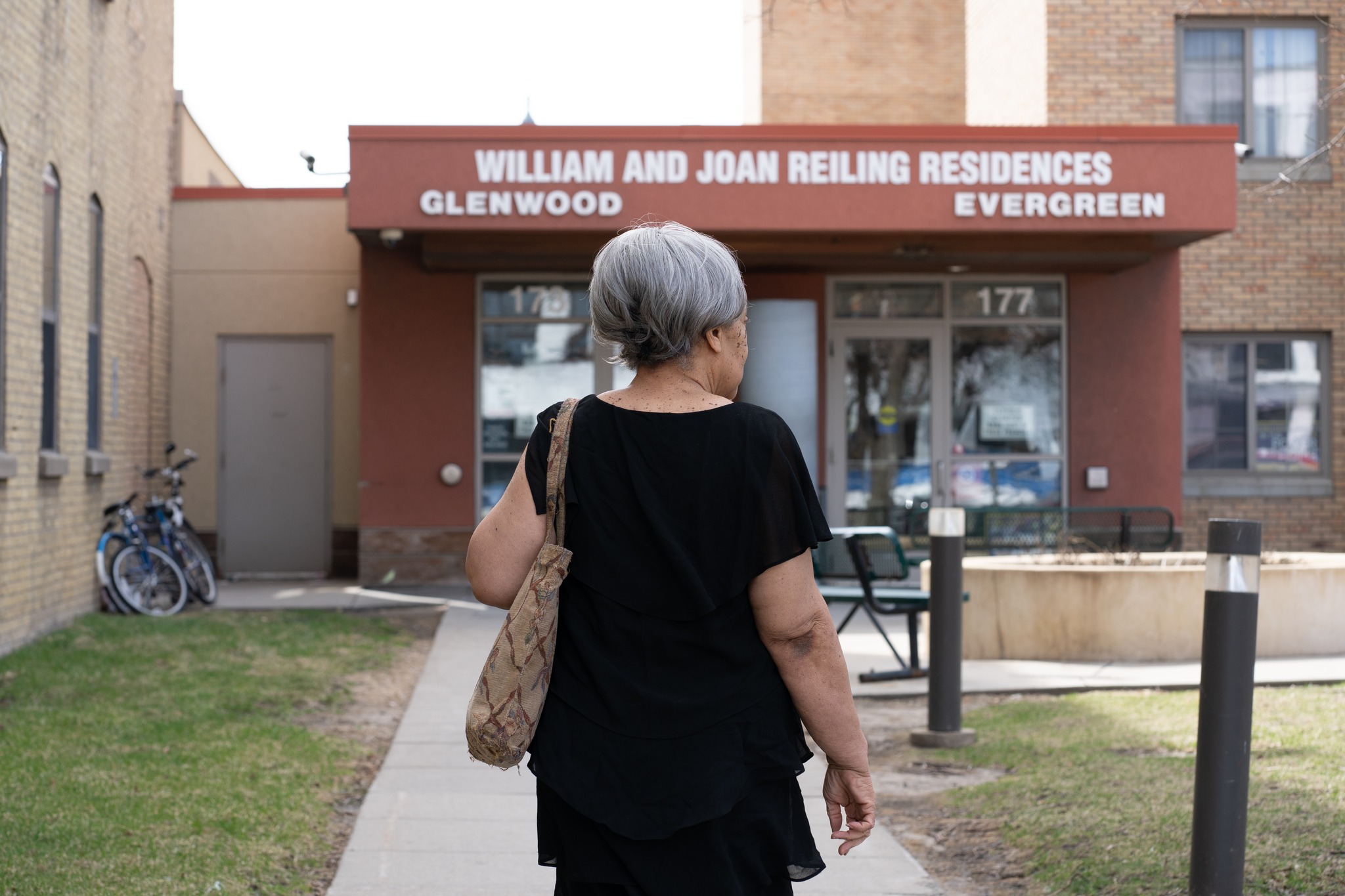
Sandra Uses her Voice at the Capitol
Sandra brought her lived experience to the Minnesota Homeless Day on the Hill. Sandra explained, “I was there to make a difference, to make a change—to represent the homeless.” Sandra testified in a public meeting, was interviewed by the Star Tribune, and met Senator Scott Dibble. “As legislators, we look at legislation, we look at spreadsheets,” said Dibble. “And those are very important, but they’re a bit abstract. They become humanized and contextualized when we meet people.”
An Experience with Youth Homelessness
Nyaluak’s Experience with Youth Homelessness
Nyaluak has always been passionate about expressing herself through art and music. She grew up in southern Minnesota and shares that her home life was often challenging. During those years, she also found that creative outlets served as a way for her to escape difficult situations.
In sixth grade, Nyaluak’s family moved to a suburb of the Twin Cities. After graduating from high school, she was excited to leave home to attend Arizona State University. Nyaluak enjoyed learning new things, as well as the independence she gained in college. However, after just one year at Arizona State, Nyaluak’s financial support fell through, and she was forced to drop out.
How Youth Homelessness Happens
Faced with the prospect of returning to a tough environment at home, Nyaluak did everything she could to find somewhere safe to stay. “I was couch hopping, staying with different friends in Minneapolis for a while, before I eventually had to return to my family’s house,” Nyaluak explained. “It was not a good decision and things got bad there — that’s when I started researching homeless shelters in the area and learned about Hope Street.”
Catholic Charities Hope Street provides shelter for young people, age 18-24, in South Minneapolis and aims to prevent future homelessness. “I decided that I really needed to get support,” said Nyaluak. “Hope Street is where I finally found resources.”
Finding Support at Hope Street for Youth
When Nyaluak first arrived at Hope Street, she was dealing with a lot of thorny emotions. Couch hopping and being on the move had affected her mental health, and she was exhausted. “I had been so many different places trying to get away from what my life was like,” Nyaluak said, “but it was never to actually improve myself – just to escape.”
When Nyaluak moved into her own room at Hope Street, she decided to engage with everything that was offered at the shelter, and she attended every group meeting, craft day, and community event that she could. At one community meeting, local artists Moira Villiard and Carla Hamilton came into Hope Street to talk about their collaborative art project: “Waiting for Beds.”
After hearing Nyaluak’s story, they encouraged her to participate in the exhibition. “I told them I would love to participate,” said Nyaluak, “and it was one of the first decisions I’ve made to better my life.”
“The situation I grew up in was hard, but it made me a stronger person and shaped who I am today,” Nyaluak explained. “Since coming to Hope Street, I’ve been able to let go of the things that were holding me back. I’m in control of my life again.”
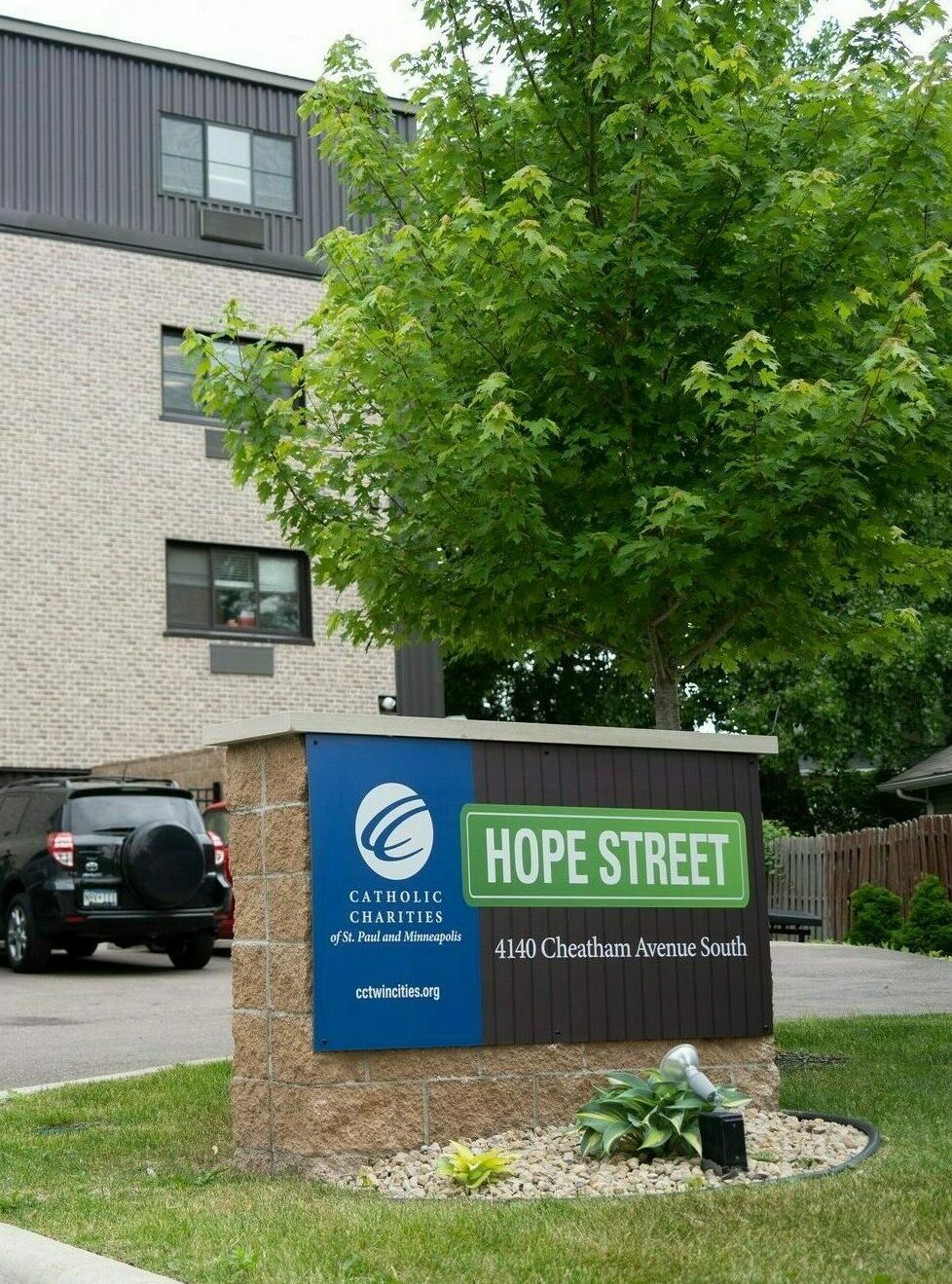
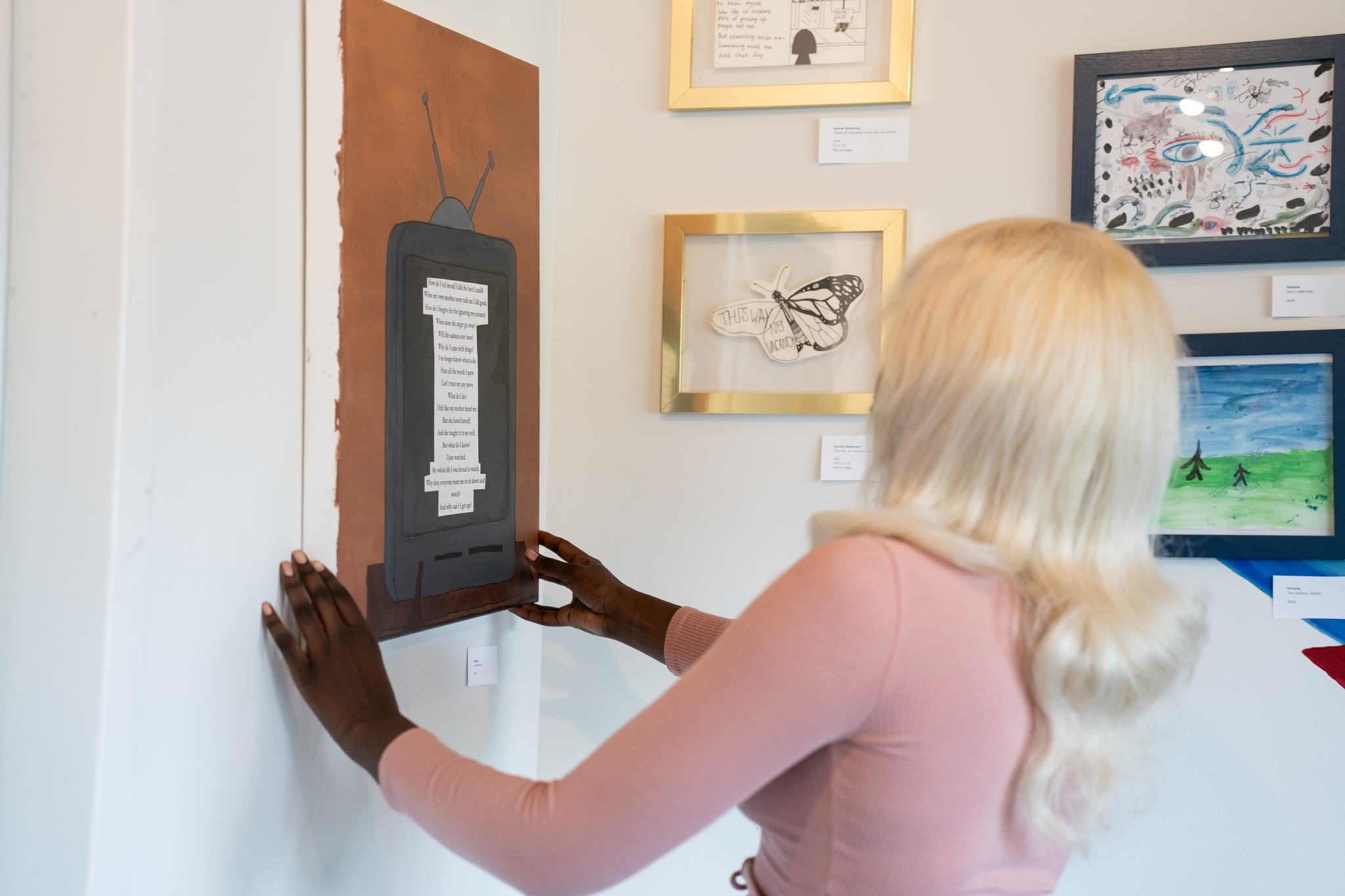
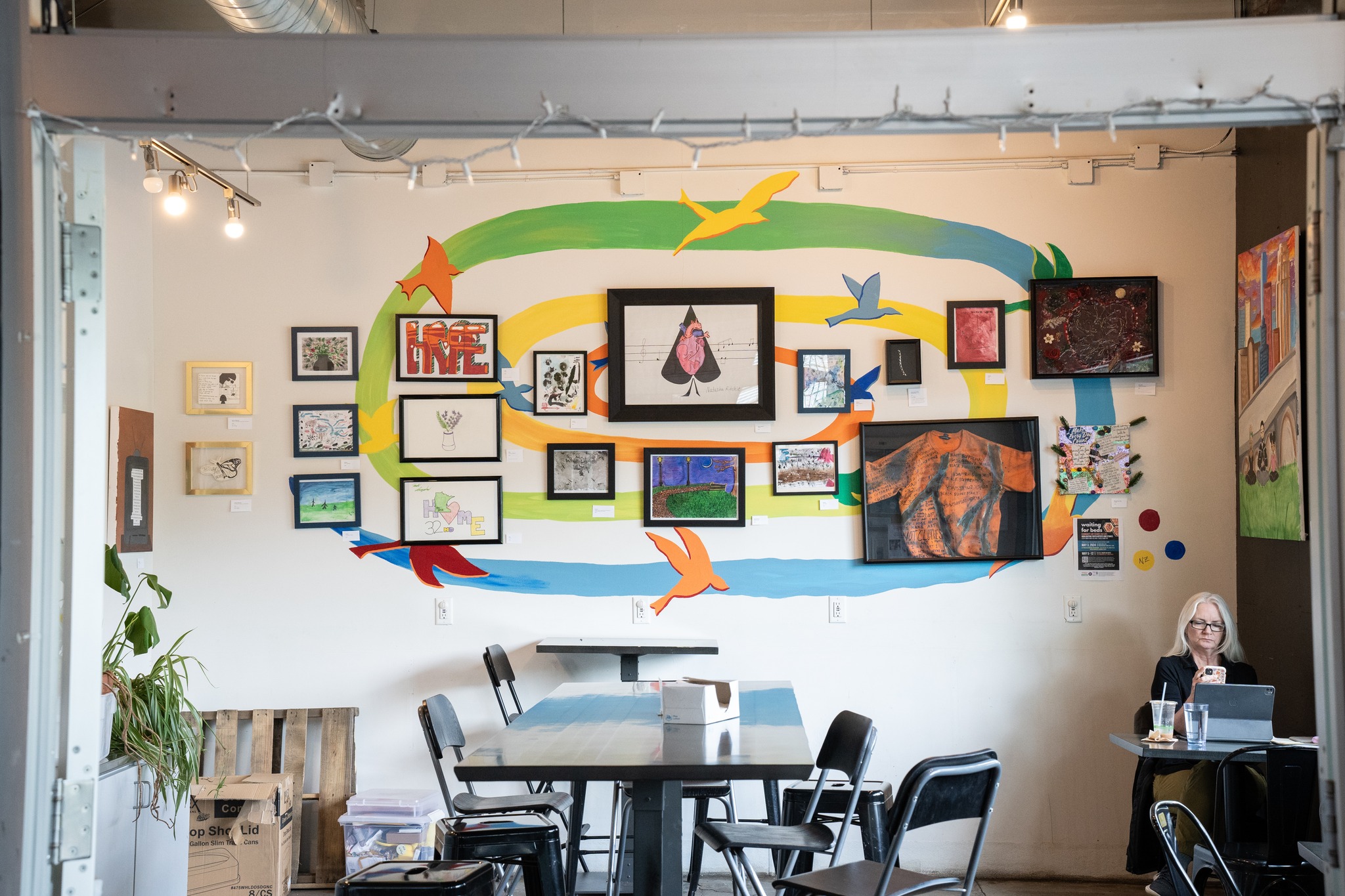
Regaining Control and Becoming a Stronger Person
“Waiting for Beds” showed Nyaluak’s multimedia painting — and artwork from nearly a dozen other youth at Hope Street — at three different galleries across the Twin Cities.
Shortly after the exhibition, Nyaluak’s Hope Street case manager connected her to a job. After interviewing, Nyaluak was proud to land the job. She continues to create art in her free time after work. And her next goal is to go back to school for music education or music therapy.
“The situation I grew up in was hard, but it made me a stronger person and shaped who I am today,” Nyaluak explained. “Since coming to Hope Street, I’ve been able to let go of the things that were holding me back. I’m in control of my life again.”
Recently, Nyaluak moved out of Hope Street and into her own apartment in Minneapolis.
Student Volunteers at Catholic Charities
Students Who Volunteer with Catholic Charities
Last year at Catholic Charities, volunteers worked over 40,000 service hours across the agency. Although most volunteers are adults, many students volunteer to work daily shifts—both in school groups, and individually. In the past year, over 150 students volunteered at Catholic Charities Twin Cities!
Volunteers at Catholic Charities Twin Cities helped serve over 1,000,000 meals to more than 25,000 men, women, and children during the last year. This summer, a handful of student volunteers have made a big impact:
Dorothea Watson
Dorothea Watson is an undergraduate student at the University of Notre Dame. She’s from Golden Valley, Minnesota, and began volunteering with Catholic Charities Twin Cities when she came home from school during winter break of 2023. She worked more than 10 volunteer shifts during that time and has started volunteering again during her summer vacation.
Dorothea has completed nearly 100 hours of service so far – exclusively at Catholic Charities Endeavors Residence. Endeavors provides deeply affordable, permanent homes to 173 people who need housing stability in downtown Minneapolis. Some apartments in the building are Board and Lodge units, whose residents have access to three meals each day. Dorothea spends her time helping prepare and serve those meals.
“I started volunteering because I’m part of the Notre Dame Club of Minnesota and I need volunteer hours,” explained Dorothea, “but I keep coming back here because I really enjoy it – it’s super convenient and I get to spend my time helping people.”
Dorothea is studying abroad in Rome next school year but has plans to return to Endeavors to volunteer while she’s home over winter break again.
Catholic Charities Communications Volunteers
This summer, two student volunteers from local high schools joined Catholic Charities to use their time in a bit of a different way by interning with the communications team. Lily Noble from Visitation School, and Alexandra Nitabach from St. Louis Park High School are spending 6 weeks of their summer break at Catholic Charities administrative office in Elliot Park to learn about marketing, journalism, socials media, fundraising, and other communications work. Their efforts will help the team and agency share stories from across Catholic Charities programs.
Prior Lake Junior Optimists
Volunteers from Prior Lake High School’s Junior Optimist Club are a group of student volunteers that spend time at Catholic Charities sites across the metro area. The Junior Optimist Club has helped nurture a culture of volunteerism at Prior Lake High School – thanks to the students there.
Advisor Dan Steger says they currently have over 200 club members—nearly 7 times more than they traditionally had when the club formed some 20 years ago. One of their student ambassadors, Maren, explained how the club has created a culture at the high school that attracts new students to their cause.
“When younger students get to the school they meet and look up to people who are in the Junior Optimist Club”, she said, “so when people become a part of it, and even after they outgrow it, volunteering is something they want to do.” Peyton, a student at Prior Lake, is a great example: he got involved with the Junior Optimists right away his freshman year thanks to a friend’s recommendation.

